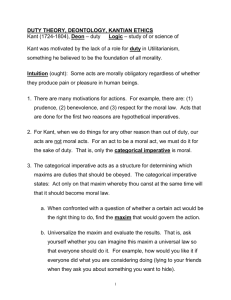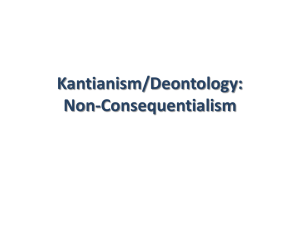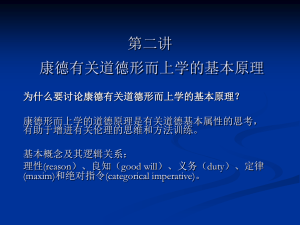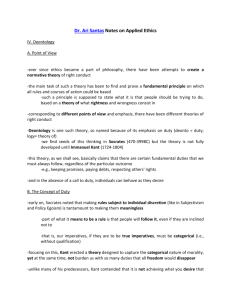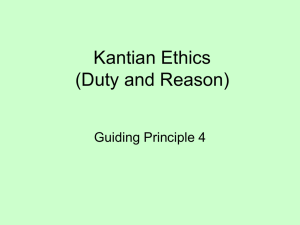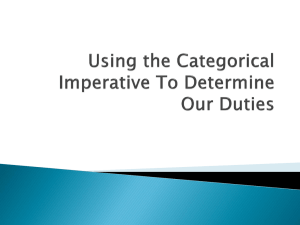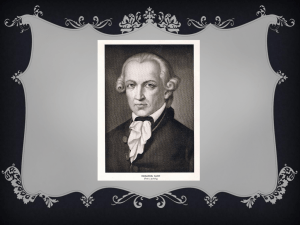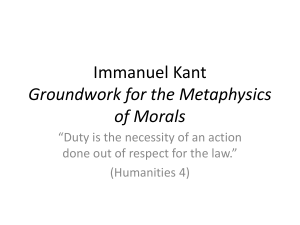Lecture 30: Utilitarian Theory
advertisement
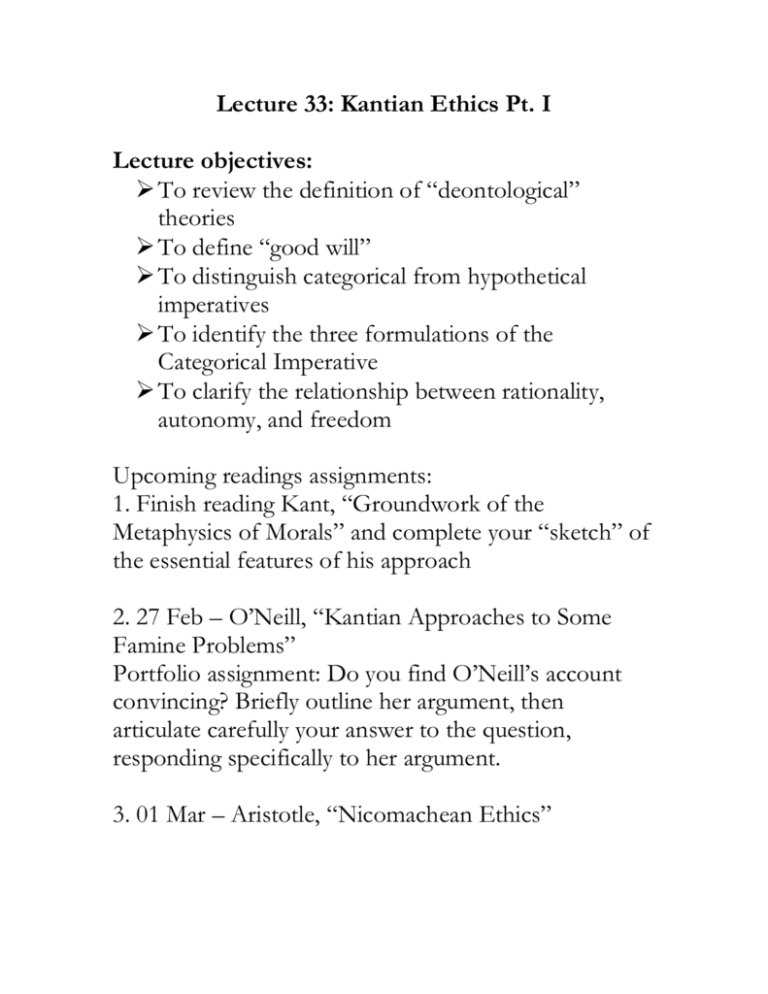
Lecture 33: Kantian Ethics Pt. I Lecture objectives: To review the definition of “deontological” theories To define “good will” To distinguish categorical from hypothetical imperatives To identify the three formulations of the Categorical Imperative To clarify the relationship between rationality, autonomy, and freedom Upcoming readings assignments: 1. Finish reading Kant, “Groundwork of the Metaphysics of Morals” and complete your “sketch” of the essential features of his approach 2. 27 Feb – O’Neill, “Kantian Approaches to Some Famine Problems” Portfolio assignment: Do you find O’Neill’s account convincing? Briefly outline her argument, then articulate carefully your answer to the question, responding specifically to her argument. 3. 01 Mar – Aristotle, “Nicomachean Ethics” Deontological theories: Some actions are intrinsically valuable or good not as a function of their consequences There is something in the nature of some acts which renders them obligatory, i.e., a moral duty These views tend to emphasize also the moral worth and dignity of persons. Kant is concerned here with establishing the conditions or principles of practical reason oriented to properly moral action. Essential features of Kantian theory: Duties from Rules of Reason: an act is morally praiseworthy only if done neither for self-interested reasons nor as the result of a natural disposition, but rather from duty. The Categorical Imperative: Supreme principle of morality (three formulations) 1. Formula of Universal Law: “Act only on that maxim [principle of action] through which you can at the same time will that it should become a universal law” 2. Formula of Humanity as an End in Itself: “Act in such a way that you always treat humanity, whether in your own person or in the person of any other, never simply as a means, but always at the same time as an end” 3. Formula of the Kingdom of Ends Duties from Rules of Reason Kant is a rationalist and an objectivist. Moral principles are objective truths. Persons or rational beings have intrinsic moral worth because of their rationality. An action is morally worthy only if performed by an agent with a good will. An agent with a good will acts from duty, out of respect for the moral law. a) Good will: to will something is to be committed to its concrete manifestation in action There is a dual sense in which someone might be called good/ill-willed. Good will will the good (to have goodwill) the will is good (to have a good will) For Kant, to have a good will is precisely to will the good. “A good will is not good because of what it effects or accomplishes – because of its fitness for attaining some proposed good; it is good through its willing alone – that is, good in itself.” The mark of a good will is one that is rational and hence is capable of identifying his/her duty and choosing it for its own sake. An action that is motivated by duty, that is done from duty, is rational and as rational, it is universalizable universalizable: 1) The object of rationality is what is objectively true, hence universalizable. 2) In virtue of the fact that we are all rational beings, what is rational for one should be rational for all, hence it is also universalizable. b) What is a maxim? “a subjective principle of action”, which prescribes what ought to be done e.g., “When I need money, I will borrow it and promise to pay it back, even though I know I cannot do so.” c) What is properly moral action? one for which the underlying maxim or principle of action accords with the supreme principle of morality, which he calls the Categorical Imperative. Subjective maxim objective moral law The Categorical Imperative a) Categorical vs. Hypothetical Imperatives Hypothetical imperatives: non-moral “ought’s” the action is seen as a means to a particular desirable end. Categorical imperatives: moral “ought’s” The action is an end in itself in so far as it is intrinsically valuable. b) Formulations of the Categorical Imperative: Formula of Universal Law “I ought never to act except in such a way that I can also will that my maxim should become a universal law.” The CI is used to test the consistency of rules or maxims. test of logical/conceptual consistency test of volitional consistency Formula of Humanity as an End in itself “no maxim which does not respect persons can be a moral law valid for all men”. this follows specifically from the principle that in virtue of being rational, the will of every rational being is a “will which makes universal law” human beings are free freedom is the locus of our dignity “Reason thus relates every maxim of the will, considered as making universal law, to every other will and also to every action towards oneself; it does so, not because of any further motive or future advantage, but form the idea of the dignity of a rational being who obeys no law other than that which he at the same time enacts himself”. Formula of the Kingdom of Ends the “kingdom” of ends is a “systematic union of different rational beings through common laws” ends = a) each of us as ends in ourselves and b) ends which each of us may set for ourselves (a) is locus of dignity; (b) is locus of market value and price. Duties: Fourfold classification Duties to oneself vs. Duties to others Perfect duties vs. Imperfect duties a) Perfect duties: must always be observed prescribe certain kinds of actions to violate these is morally blameworthy derived form requirement of logical consistency e.g., duty not to lie, duty not to kill innocent persons, duty to keep promises, duty not to commit suicide b) Imperfect duties: prescriptions concerning general ends fulfilling them is praiseworthy must be observed on some occasions, usually at our discretion derived from requirement of consistency in willing e.g., duty to develop one’s talents, duty of beneficence or charity If there is a conflict, a perfect duty always overrides an imperfect duty.
